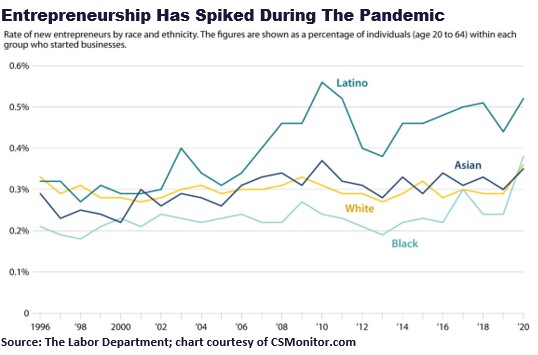As regular readers know, I like to write about what interests me most each week, especially in the Blog. Today, we’ll look at business start-ups which are surging, but probably not for the reasons you might think.
Americans are starting up new businesses at an unprecedented rate this year – and many of them from home. According to the latest figures released by the US Census Bureau last month, more than 492,000 start-up applications were filed in January alone, an increase of nearly 75% from the same period last year – and the pace reportedly continued in February.
At that rate, we could see nearly 6 million new businesses started in 2021, a record, up from 4.3 million applications in 2020 and 3.5 million in 2019, an increase of about 23% year over year. The stats are from tax forms filed with the IRS.
So, who is starting all these new businesses? The answer may surprise you… or maybe not. Most of these start-ups involve “e-commerce,” retail, financial and health services, which can be run from home. Many factors are driving this trend, but perhaps the biggest is that so many people have recently been working from home – or more significant – are unemployed.
In short, more Americans are starting new businesses because they are out of a job and have no other choice but to generate an income which can support their families. The jobless not only need the extra income, but they also have more time, freedom and flexibility to become entrepreneurs.
Another factor: Employees suddenly having to work from home have more time on their hands to try freelancing. Unlike the Great Recession of 2008-09, banks weren’t squeezed and didn’t stop lending. And the values of homes rose, giving entrepreneurs a key asset to borrow against to fund their ventures.
The retail sector is seeing the biggest jump in startups. Retail applications in 2020 ran more than 50% higher than a year earlier. The biggest growth came from retailers selling goods online or for direct delivery rather than in stores – perhaps not surprising given the changes the pandemic has wrought. It’s these shifts that open up the possibilities for new businesses.
Many of these new startups are sole proprietorships and are likely to stay this way. While small firms are significant, the crucial ones for economic growth are companies that hire multiple employees. Applications for businesses likely to hire multiple employees are up 15.5% from 2019 and more than 20% higher than the average for the previous decade.
The rise is taking place across the board – representing all kinds of industries, from home-based companies flying almost under the radar to firms aiming to make a big splash. This is great news for the economy and explains in part why forecasters have been increasing their projections for economic growth this year.
Unfortunately, not all the news is good. The pandemic has not been kind to working women. Women have an inordinately large footprint in retail and service, which were harder hit last year. And working mothers typically have had to shoulder more child care and education responsibilities than men during the pandemic.
While the number of female entrepreneurs jumped last year, according to the Kauffman Foundation, it was not enough to overcome the long-standing gap with male entrepreneurs, whose numbers also jumped even more last year.
Between February and April last year, 3.5 million adult women left the labor force and despite a growing number of jobs, two-thirds of them have yet to return. That workforce erosion has been significantly greater for women than for men.
Black entrepreneurship, on the other hand, is a different story. After lagging other racial and ethnic groups for the past quarter century, the share of entrepreneurs within the African American community jumped last year to the level of white Americans for the first time, the Kauffman Foundation found. Latinos continued to outpace both of those groups, as well as Asians.
The bottom line is, we welcome increases in entrepreneurship and new business startups for whatever reasons they occur. In this case, though, we need to be aware that this surge in growth is driven in large part because so many Americans lost their jobs last year and have had little choice in many cases but to start their own new ventures.


Sorry, comments are closed for this post.